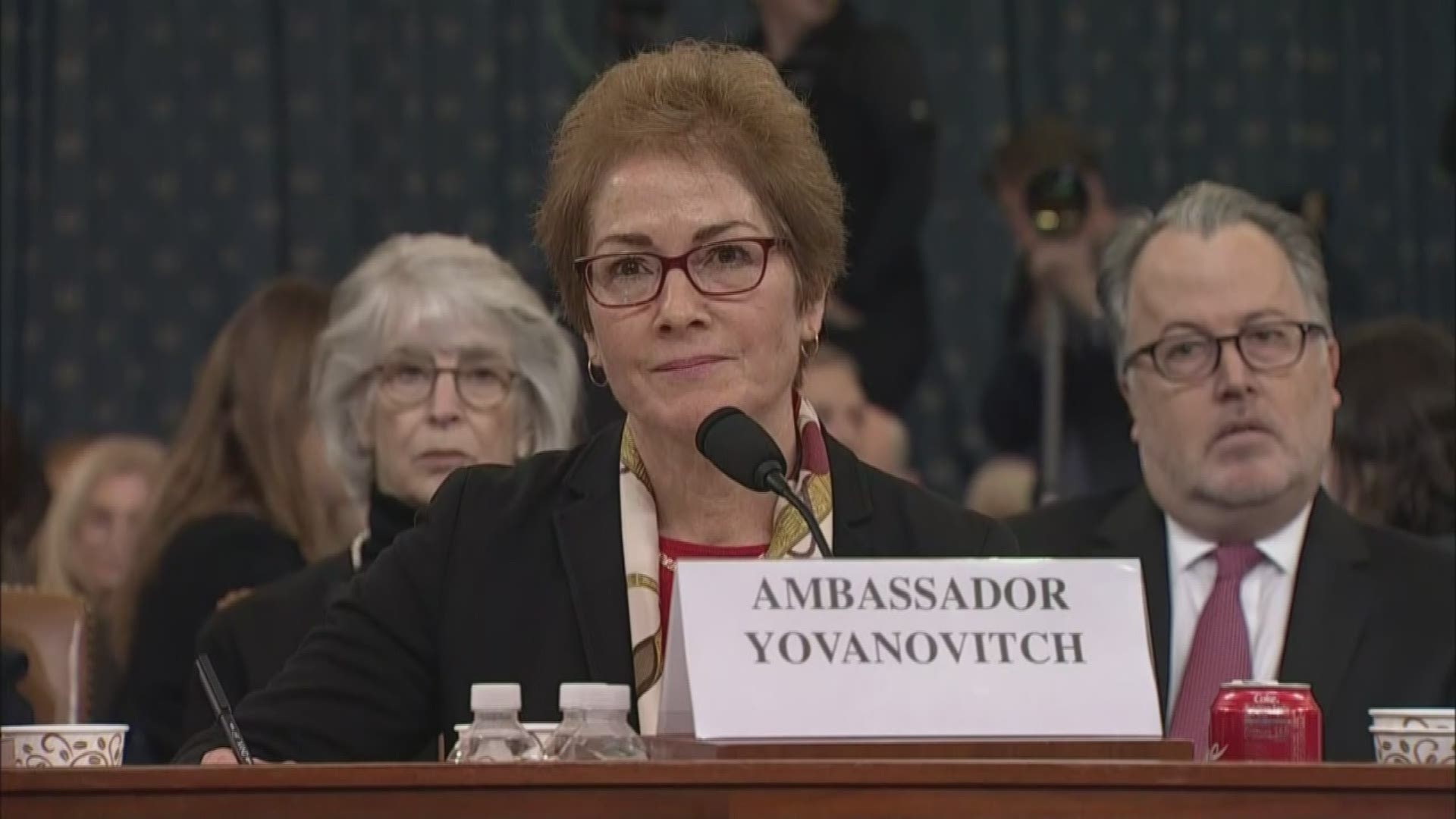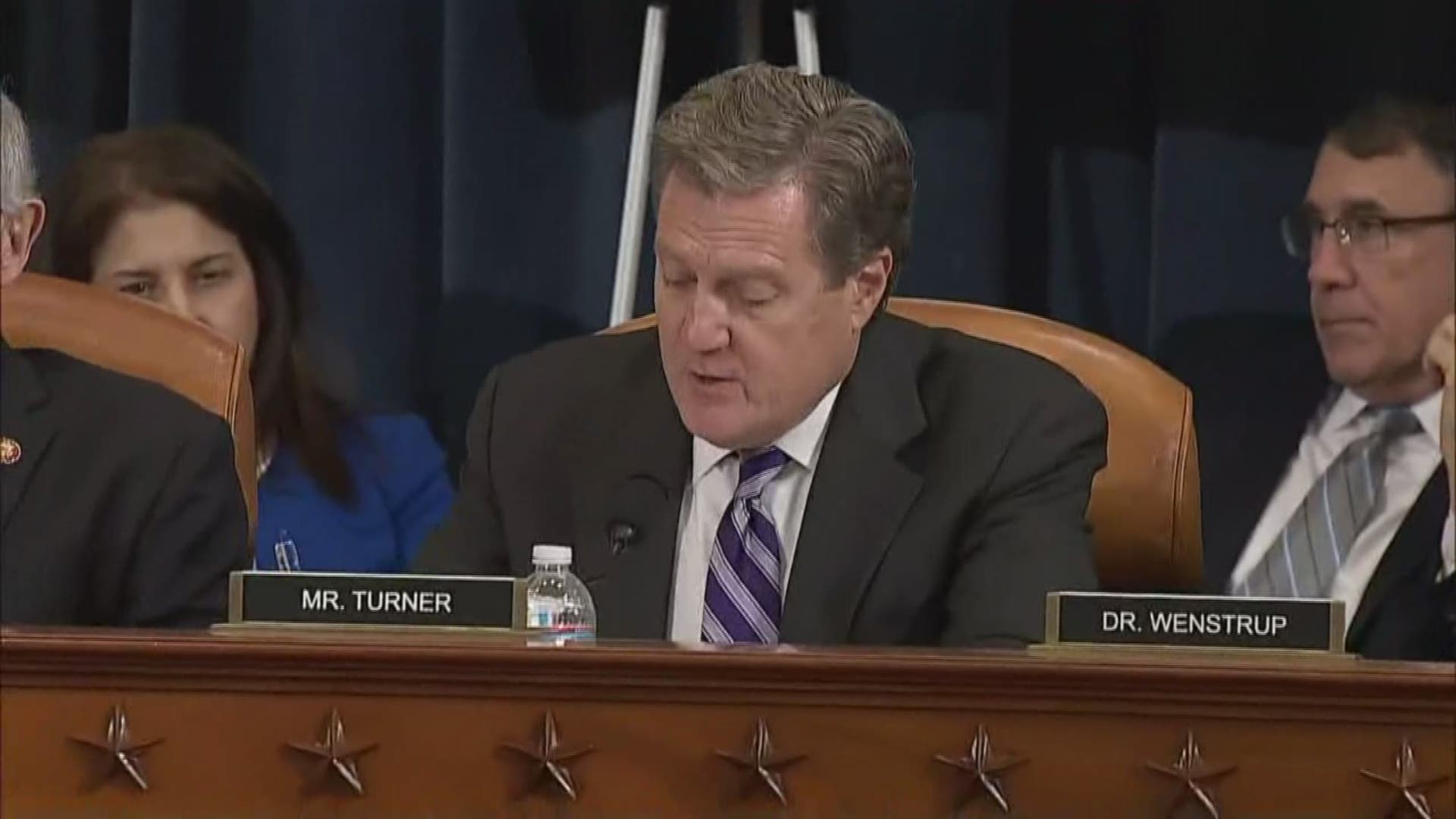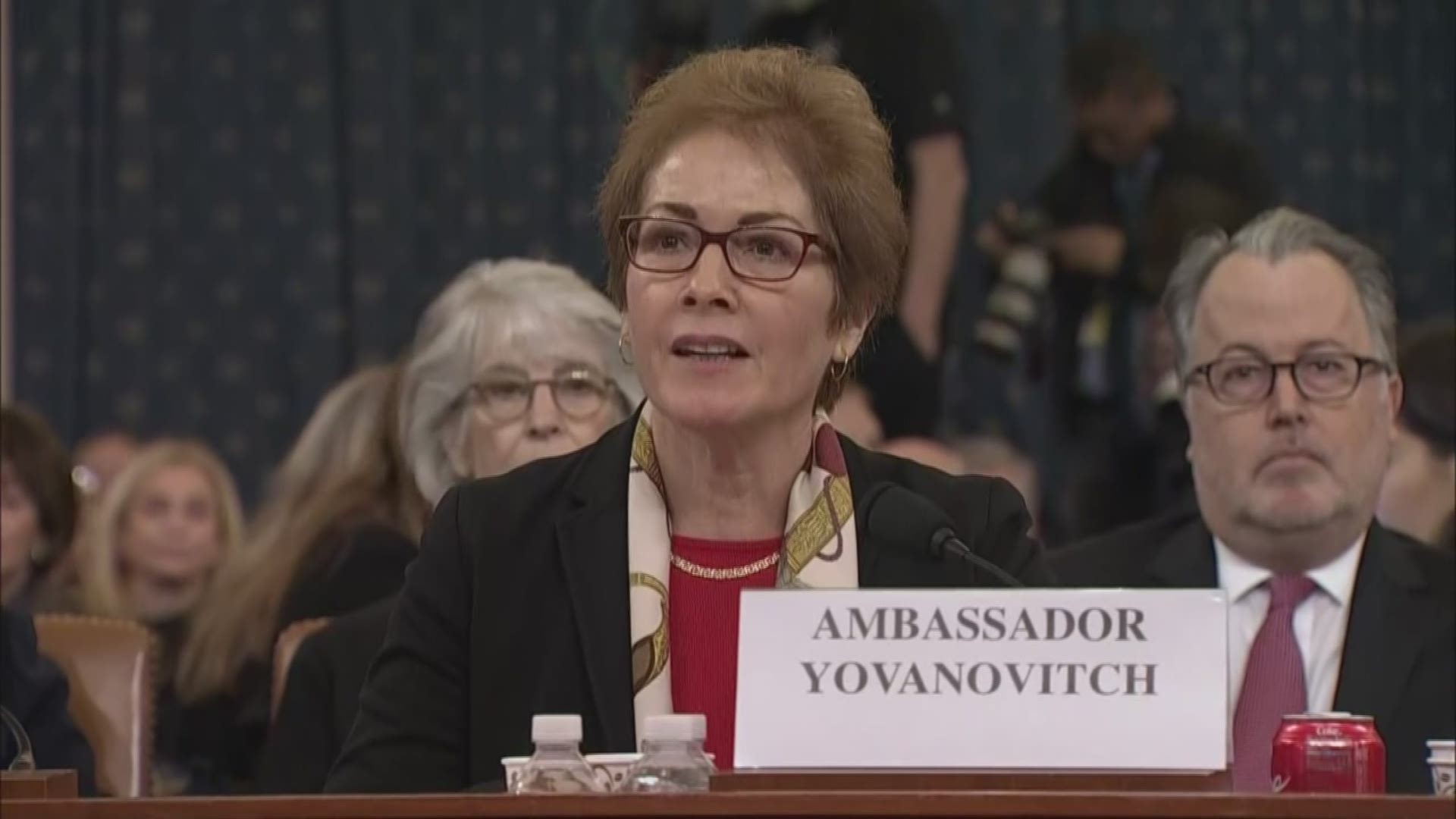WASHINGTON — Former U.S. Ukraine Ambassador Marie Yovanovitch provided chilling detail Friday in Trump impeachment hearings of being suddenly ousted from her post and feeling threatened upon learning President Donald Trump had denounced her in a phone call to Ukraine’s president. In that call, Trump assailed her as “bad news” and said she was “going to go through some things.”
In an extraordinary moment, even in an administration filled with them, Trump himself went after her again as she spoke, tweeting from the White House that everywhere she served had “turned bad.”
Asked at the hearing about the potential effect of such censure on U.S. officials and witnesses, she said, “Well, it's very intimidating.”
Yovanovitch was testifying on the second day of public impeachment hearings into Trump, just the fourth time in American history that the House of Representatives has launched such proceedings. The investigation centers on whether Trump’s push for Ukrainian officials to investigate his political rivals amounted to an abuse of power, a charge he and Republicans vigorously deny.
After Trump’s tweet on Friday, the chairman of the House Intelligence Committee swiftly intervened, halting the questioning to read the president’s comments out loud to the witness -- and Americans following the hearing -- during a live broadcast across the country.
“Ambassador Yovanovitch, as we sit here testifying, the president is attacking you on Twitter,” said Democratic Rep. Adam Schiff of California. He asked if it was designed to intimidate.
“I can’t speak to what the president is trying to do, but I think the effect is to be intimidated,” she said.
Said Schiff, “Well, I want to let you know, Ambassador, that some of us here take witness intimidation very, very seriously.”
Trump, asked about it later, said, “I have the right to speak. I have freedom of speech.”
Rather than distract from the career diplomat’s testimony, Trump’s interference could provide more evidence against him in the probe. Democrats said an allegation of witness intimidation could become an obstruction of justice charge in the impeachment probe.
In her testimony, Yovanovitch described a “smear campaign” against her by Trump’s personal lawyer, Rudy Giuliani, and others, including the president’s son, Donald Trump Jr., before her firing.
She told the lawmakers her sudden removal had played into the hands of “shady interests the world over” with dangerous intentions toward the United States. They have learned, she said, “how little it takes to remove an American ambassador who does not give them what they want.”
She said quietly, “Even now words fail me.”
Her removal from her post is one of several events at the center of the impeachment effort.
In his July phone call with new Ukrainian President Volodymyr Zelenskiy, Trump asked for a “favor,” according to an account provided by the White House. He wanted an investigation of Democrats and 2020 rival Joe Biden. Later it was revealed that the administration was withholding military aid from Ukraine at the time.
“These events should concern everyone in this room,” the diplomat testified in opening remarks.
Schiff, the Democratic chairman of the panel, said she was “too tough on corruption for some, and her principled stance made her enemies.”
It became clear, he said, “President Trump wanted her gone.”
The daughter of immigrants who fled the former Soviet Union and Nazi Germany, she described a 33-year career, including three tours as an ambassador to some of the world’s tougher postings, before arriving in Ukraine in 2016. She was forced out in May 2019.
She denied allegations against her, including that she favored Democrat Hillary Clinton over Trump in the 2016 election, and she rejected the notion that Ukraine tried to interfere in the election, as Trump claims, counter to mainstream U.S. intelligence findings that it was Russia.
The top Republican on the panel, Rep. Devin Nunes of California, bemoaned the hearings as a “daylong TV spectacle.”
Nunes complained that Democrats are relying on hearsay testimony from witnesses who only know of Trump’s actions second-hand, and Republicans noted during questioning that Yovanovitch had left her position before the July phone call.
Nunes also pressed to hear from the still anonymous government whistleblower who first alerted officials about Trump’s phone call with Ukraine that is in question. “These hearings should not be occurring at all,” he said.
But one Republican, Rep. Liz Cheney of Wyoming, said Trump’s live tweeting at the ambassador was wrong. She said, “I don’t think the president should have done that.”
Just as the hearing was opening, the White House released its rough transcript of a still-earlier Trump call with Zelenskiy that was largely congratulatory.
Nunes read that transcript aloud. In it, Trump mentioned his experience with the Miss Universe pageant in Ukraine and invited Zelenskiy to the White House. He closed with, “See you very soon.”
Yovanovitch, a career diplomat, who has served both Republican and Democratic presidents, relayed her striking story of being told to “watch my back” and then being suddenly recalled by Trump in a swiftly developing series of events that sounded alarms about a White House shadow foreign policy.
In particular, Yovanovitch and others have described Giuliani, Trump’s lawyer, as leading what one called an “irregular channel” outside the diplomatic mainstream of U.S.-Ukraine relations. Asked during an earlier, closed-door deposition if anyone at the State Department who was alerted to Giuliani’s role tried to stop him, she testified, “I don’t think they felt they could.”
Under questioning from Republicans, she acknowledged that Joe Biden’s son, Hunter, serving on the board of a gas company in Ukraine could have created the appearance of a conflict of interest. But she testified the former vice president acted in accordance with official U.S. policy.
The White House has instructed officials not to comply with the probe, and most have been issued subpoenas to appear.
Later Friday, the panel in closed-door session was to hear from David Holmes, a political adviser in Kyiv, who overheard Trump asking about the investigations the day after the July conversation with Zelenskiy. Holmes was at dinner with Gordon Sondland when the Ambassador to the European Union called up Trump. The conversation was apparently loud enough to be heard.
Trump says he knows nothing of such a call. The Associated Press has reported a second U.S. Embassy official also overheard it.
Yovanovitch and other officials now testifying publicly are providing accounts that Democrats are relying on to make the case that the president’s behavior was impeachable.
Americans are deeply entrenched in two camps over impeachment, resulting in a mounting political battle that will further test the nation in one of the most polarizing eras of modern times.
House Speaker Nancy Pelosi says Trump’s actions toward Ukraine amount to “bribery.”
Trump repeatedly assails the proceedings as a “hoax” and a “sham” and says he did nothing wrong.
___
Associated Press writers Eric Tucker, Laurie Kellman, Jonathan Lemire, Andrew Taylor, Alan Fram, Matthew Daly and Jill Colvin contributed to this report.



